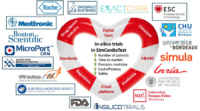VPHI participates in the SimCardioTest project, whose main objective is to demonstrate the feasibility, efficacy and benefits of in silico trials of drugs and cardiological devices. It's a project with a significant impact on clinical trials, regulatory systems and healthcare innovation.

SimCardioTest project is being funded by the European Commission to develop a standardised and secure cloud-based platform where in-silico trials run seamlessly.
SimCardioTest is an international consortium of 10 partners, including VPHi, organized through the SimCardioTest project is set to design new predictive tools. EU funding of 8 million Euros will enable this major collaboration effort. The project is coordinated at Inria.
The SimCardioTest project will use personal data previously collected for medical purposes in the context of routine care. These data will be pseudonymized and anonymized. Technical security measures are in place to safeguard the rights and freedoms of the data subjects in order to respect the ethical conduct of research imposed by the European Commission (ethical evaluation procedure H2020), and compliance with the General Data Protection Regulation (GDPR). This project has received 8 mln euros funding from the European Union’s Horizon 2020 research and innovation programme under grant agreement No 101016496.
In-silico methods, together with high-performance computing infrastructures, the increasing availability of patient-specific data and big data analysis based on artificial intelligence, has the potential to bring clinical trials to the 21st century, leveraging standardised and trustworthy computational approaches.
Three cardiac use cases will demonstrate the platform effectiveness, along with the required verification & validation processes and certification support of the medical device or medicine. A unified web platform will enable to test the safety and efficacy of drugs and devices.
The project will specifically work on three case-studies:
- modeling for in-silico simulation of catheterisation and pacing devices (catheter navigation, pacing performance and mechanical fatigue). It will leverage a physical simulator using 3D printing and soft robotics.
- modeling for in-silico fluid simulations for stroke risk management (thrombus formation and drug treatment, for better patient selection, device setting personalisation and prediction of treatment response).
- modeling for drug-ion channel interaction to analyse the effects of drugs at a multi-scale level from cell to organ, in normal and pathological conditions, such as ischemia, heart failure or atrial fibrillation